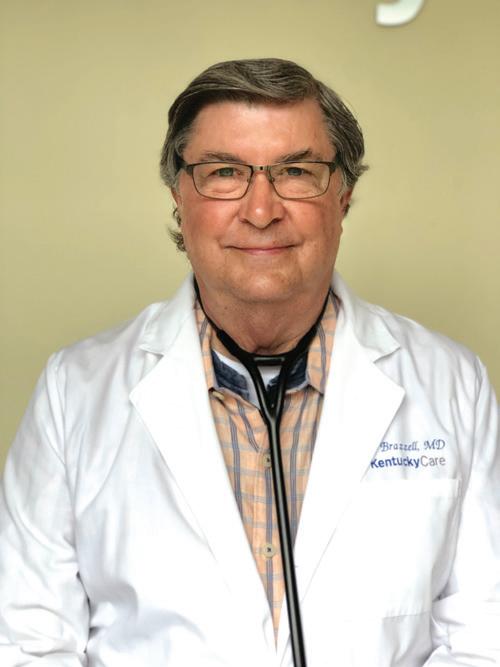
9 minute read
OUR ROLES IN OPIOID CRISIS
Good intentions, poor oversight and deception create tragic combination
Everyone knows about the opioid epidemic, but do you realize the role prescription, or legal, drugs play in this dilemma?
Misuse, abuse and diversion of prescription drugs are significant contributors, especially when users turn to other means after their prescriptions run out. If they suffer withdrawal symptoms, they may look for other relief, including heroin. In fact, 80 percent of heroin users started with a prescription drug. Here are a few other disturbing facts:
• The U.S. has 5 percent of the world population, but consumes 80 percent of all opioid medication.
• The U.S. consumes nearly 100 percent of the world’s total hydrocodone (LorTab) and 80 percent of oxycodone (Oxycontin).
• The number of prescriptions written by practitioners in the U.S. reached a peak of 282 million in 2014, but still stood at approximately 150 million in 2020.
• Drug overdose is the leading cause of accidental death in the U.S., surpassing auto accidents and falls, with overdose from prescription drugs accounting for almost 70 percent of all drug overdoses.
Many have played a role in this crisis.
Inadequate research and aggressive marketing by pharmaceutical companies opened the door many years ago. Our Food and Drug Administration approved powerful and addictive drugs for longterm use based on evidence of short-term efficacy and safety.
Physicians and practitioners wanted to relieve pain and suffering, but prescribing addictive medication was not the answer.
Our society’s mindset of instant reward contributed to the desire of immediate relief of all pain. This, of course, is not achievable.
In short, our opioid crisis is a result of a tragic combination of good intentions, deception and reckless oversight.
JOHN W. BRAZZELL, M.D. Volunteer Medical Consultant at Lifeline Medical director at Kentucky Care, Paducah
Thankfully, we have made progress. Physicians and practitioners have changed prescribing habits and recommended alternative therapies to relieve pain. Pharmaceutical companies have admitted their wrongdoing, and, in some cases, pleaded guilty to criminal charges for misleading marketing of these drugs as safe.
Prescription drug monitoring programs, like KASPER (Kentucky All Schedule Prescription Electronic Reporting), now identify patients vulnerable to prescription drug abuse and diversion.
Consumers are better educated about the potential for addiction to prescription opioids and more receptive to alternative treatments, such as injections, nerve blocks, topical medication, anti-inflammatory medication, physical therapy, meditation and spiritual enhancement.
What else can you do?
• Be more proactive in your care.
• Be honest about a personal or family history of addiction.
• Be specific and persistent about medications you want to avoid.
• Be accountable, and ask a friend or family member to check on you frequently.
We all must communicate and work together to solve this national epidemic.
After 2 other rehab stays, Mayfield woman finds new direction at Lifeline
Ali Berry, 29, of Mayfield, had a charmed childhood. She was a junior deacon at her church, a high school cheerleader and a gifted and talented student who earned five academic scholarships. As she discovered, that background proves “chemical dependency holds no prejudice.”
“I decided then I would never do drugs,” she said. “Instead, I turned to alcohol, which is almost worse because it’s legal. It led me to the same terrible places that my friends on pills went.”
Those “terrible places” included jail and three rehab centers.
Her last rehab – nine months at Lifeline Recovery Center – ended in September 2020. She is still sober and proudly marks Dec. 16, 2019, as the start of her sobriety.
Ali looks back at how the addiction started. “I was always a partier,” she said, “and I fell in with some really rough people. I developed a co-dependency and then suffered repeated domestic violence. Then I had a terrible car wreck, so I drank more and more.”
She lost her home, her car and, worst of all, custody of her 3-year-old son. She suffered the emotional loss of miscarriage and physical injuries from domestic violence and the car wreck. Because of her pain and loss, she entered her first 30-day rehab program voluntarily.
“What else do you do? I was at rock bottom. I admitted I didn’t know how to live, my family was done with me,” she said.
Ali relapsed and was court-ordered into a second 30-day program. While she was there, the sister of her late friend helped her get into Lifeline. That turned out to be the life changer.
Indeed, she spent the next decade addicted to vodka. “I drank whenever I was awake. I drank all day. I drank when I put my child in a car seat to go get more vodka.”
Her addiction led to what she calls a “season of trauma,” even after she had seen firsthand the devastating effects on a friend.
When that high school friend suffered a deadly drug overdose, Ali made a decision.
“From the moment I pulled onto the property, I knew they loved me,” she said. “Everything they taught me, they did themselves.”
Her attitude changed within weeks. “I felt better. I felt privileged to be there. They didn’t put up with anything, but I knew I could trust the people in charge of me to help me.”
Ali left Lifeline at the end of her six-month treatment and lived with her parents for the last three-month outpatient term. After completing the full nine months and graduating, she has moved into her own place and has her son back. She recently married.
After a decade of addiction to vodka, Lifeline Recovery Center graduate Ali Berry of Mayfield celebrates sobriety with her son.
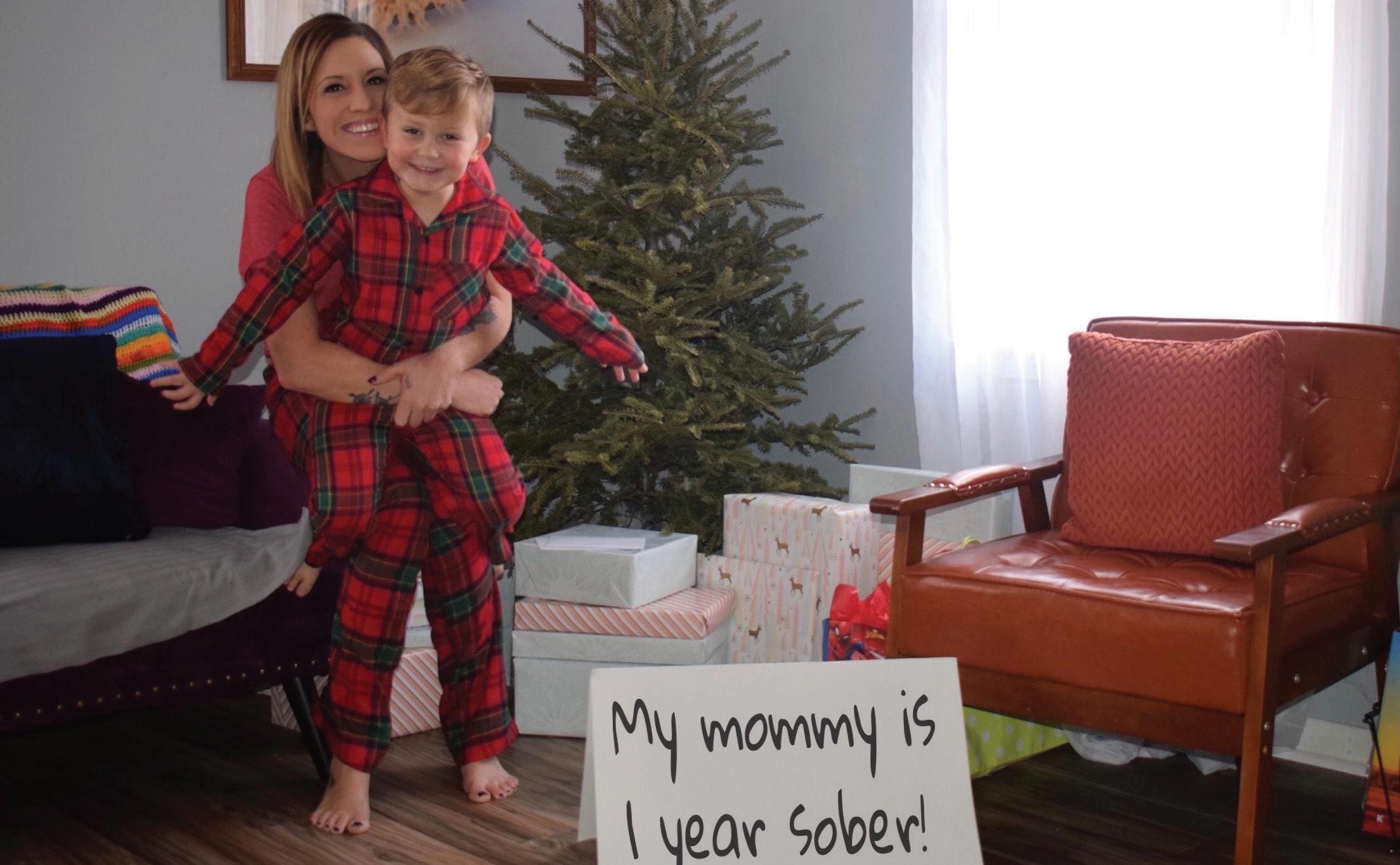
47 Meth
Top four addictions among 2019 clients
27 Opiates
19 Marijuana
Like many Lifeline graduates, she finds she must stay connected to her healing place, so she volunteers at Lifeline.
“It’s my connection to Lifeline that keeps me doing
9 Alcohol so well. They are my friends and my mentors,” she said. “I didn’t think I could live without drinking, but I tell these new girls, God is not a respecter of persons. What He did for me, He can do for you. It’s miraculous.”
Nutrition,
Eat right and exercise.
That’s sound advice for good health for everyone. For people recovering from alcohol or drug addiction, it’s critical.
To help meet Lifeline’s vision to “help individuals become spiritually alive, mentally sound and physically well,” our women’s campus recently added two important classes in nutrition and fitness.
“When you’re addicted, you skip meals,” said Melissa, who began treatment in January. Skipping meals deprives the body of valuable nutrients when they’re in the greatest demand to detoxify.
The University of Kentucky Cooperative Extension Service provides a weekly class through its Supplemental Nutrition Assistance Program. Stephanie Caldwell is the instructor.
As she covers topics ranging from food safety to meal planning and budgeting, Stephanie reminds the clients: “We learn one step at a time. This is not about a diet, but about making healthy choices for the recovering body.”
Her goal is not only to help clients while they are at the center, but also to teach them how to make better choices for themselves and their families when they go home.
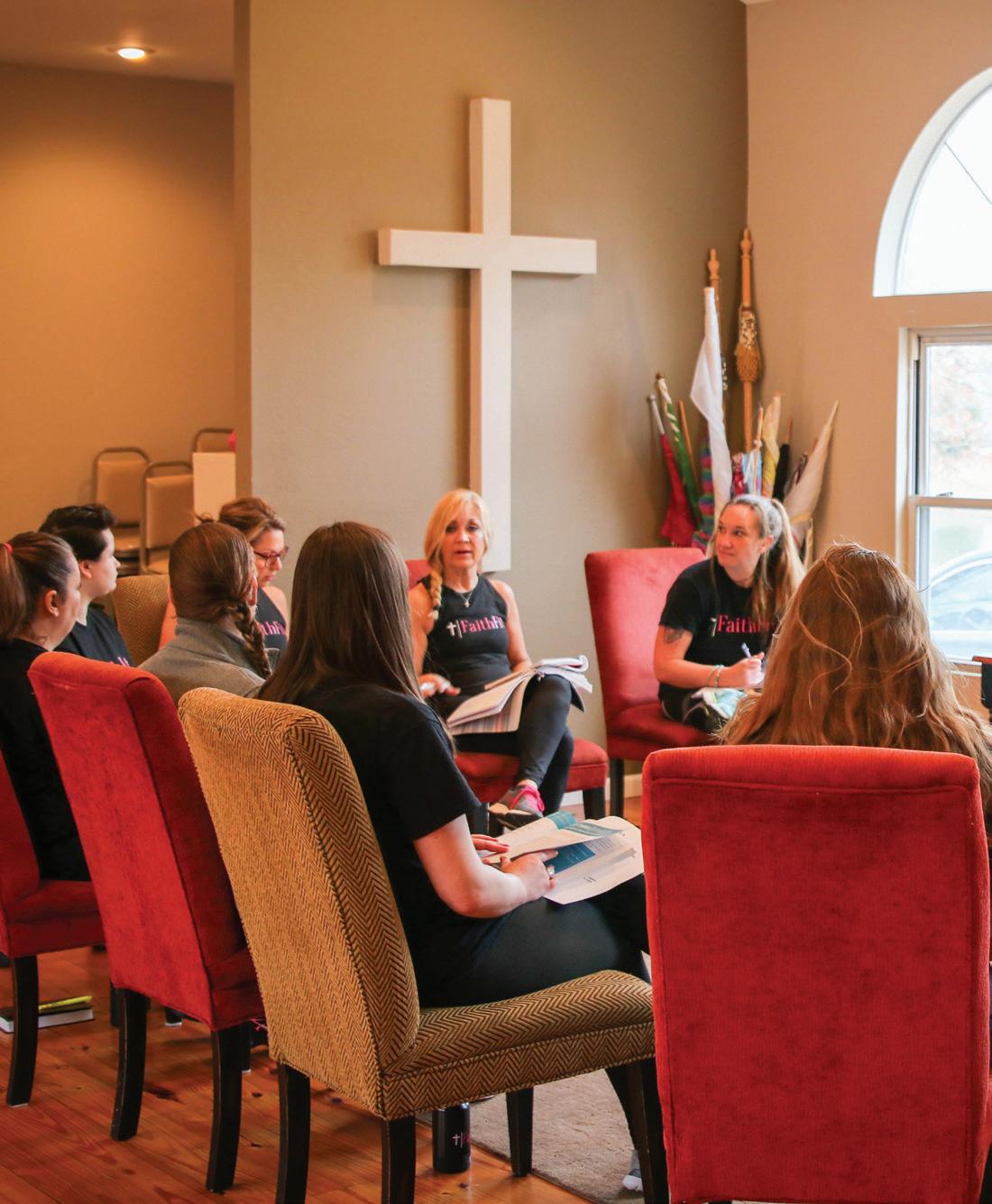
For example, they have learned about the ill effects of sugar and caffeine, which produce highs and lows.
Jennifer, who also began treatment in January, said she now checks food labels. “Pop Tarts are not healthy at all,” she said, “and Nutri-Grain bars are worse. You might as well just eat straight sugar!”
The women attend two or three fitness sessions weekly in the exercise room, sporting new
“FaithFit” clothing and shoes.
Audrey, who also began treatment in January, said: “Everyone wants to feel good. We had been relying on drugs or alcohol for our endorphins. Now, we’re learning we can feel good when we eat better and exercise.”
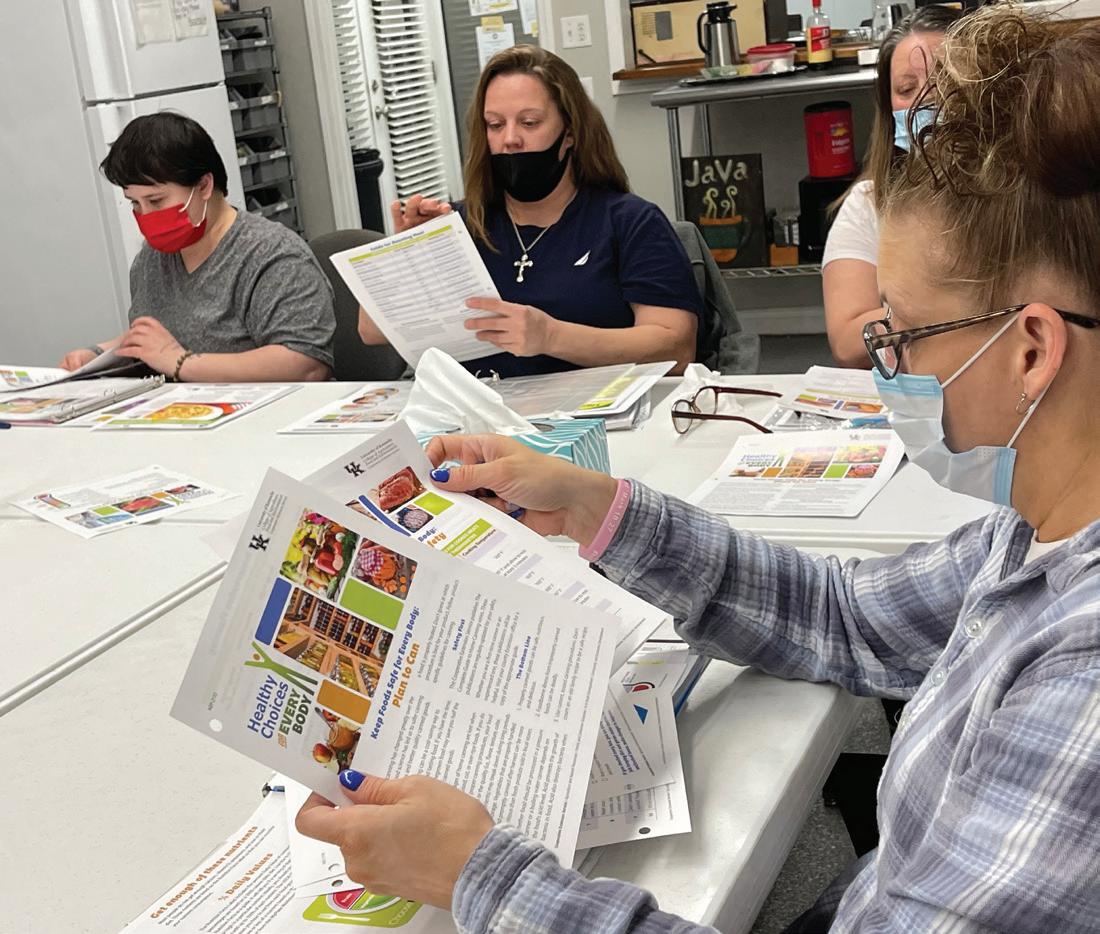
The exercise classes also relieve stress.
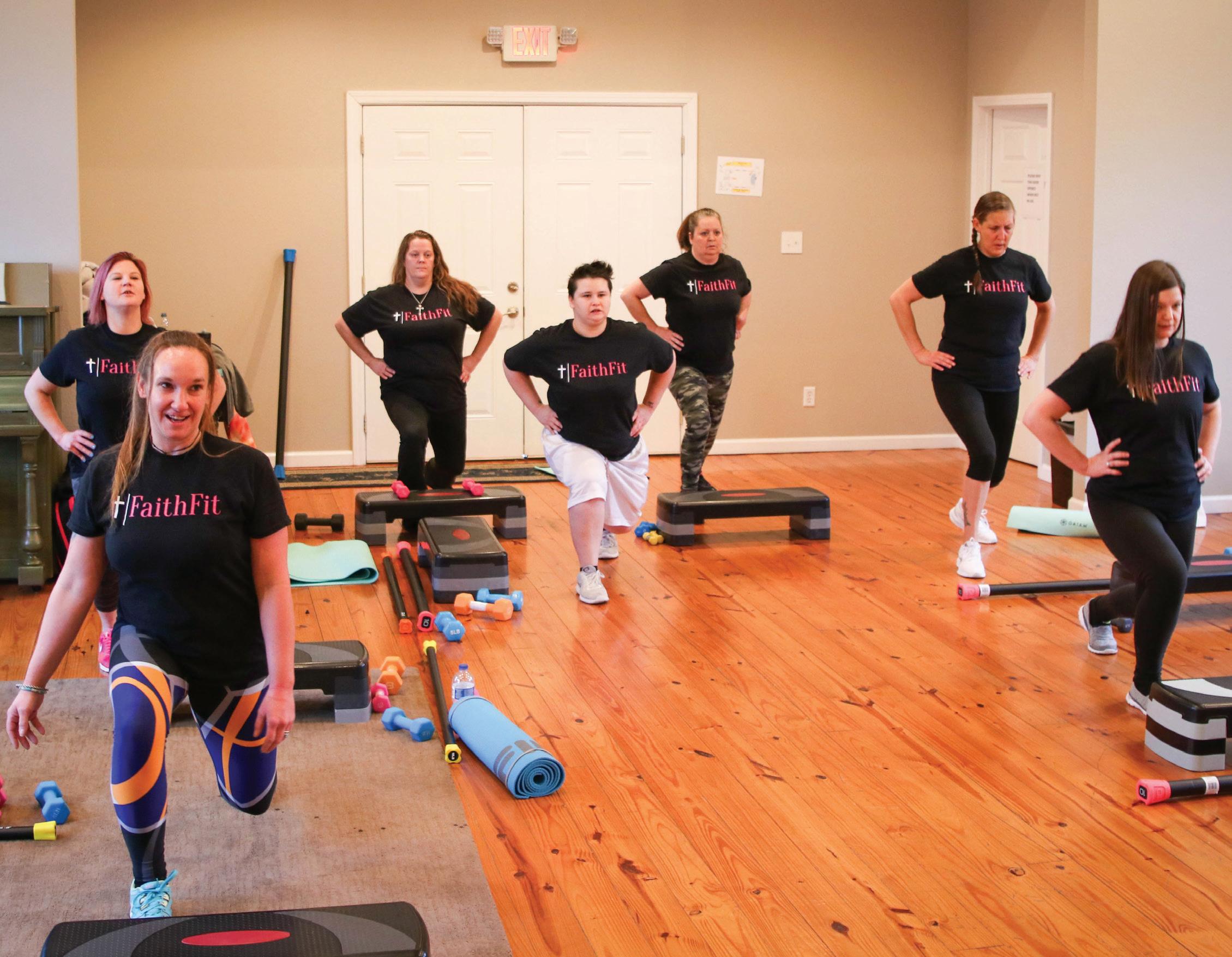
In just a few weeks, the classmates feel the difference in themselves and see it in each other.
“You wouldn’t even recognize us from our pictures just a month ago,” said Melissa. “The color has come back in our skin and hair, and that’s important to our self-image. When you look good, you feel good!”
Part Of Their Ministry Donor
Monthly donors ‘trying to be people God wants us to be’
Jeff and Terri Holland would like to put Lifeline Recovery Center out of business by eliminating addiction. Until then, they believe it’s their Christian duty to support its work.
“We support other charities to help young people make good choices,” Jeff said, “but, realistically, we know, whether it’s from bad choices or bad circumstances, many in our community ultimately need help in breaking addictions. That’s why Lifeline Recovery Center is also one of the primary ministries we support.”
The Hollands are members of Rosebower Baptist Church, a long-time supporter of Lifeline. “Rosebower put Lifeline in its budget many years ago,” he said, “and that got us thinking that we should do the same with our personal budget.”
Their monthly contribution is on autopay with their credit card.
“We give our 10 percent tithe to our church,” Jeff said, “but we have been blessed to be able to give more, so we can supplement other important ministries. They are all ministries out of God’s word, and we’re just trying to be the people God wants us to be.”
They consider Lifeline important for our community because of its success rate – 63 percent of graduates are sober a year after they leave – and its cost. “People have a lot of treatment options, but most of them are not in our community, and most will cost them many thousands of dollars.”
Lifeline’s donor support, from the Hollands and hundreds of other individuals and organizations, keeps costs low for clients, just $2,400 for six months of residential treatment and $125 a week for up to three months of transitional care.
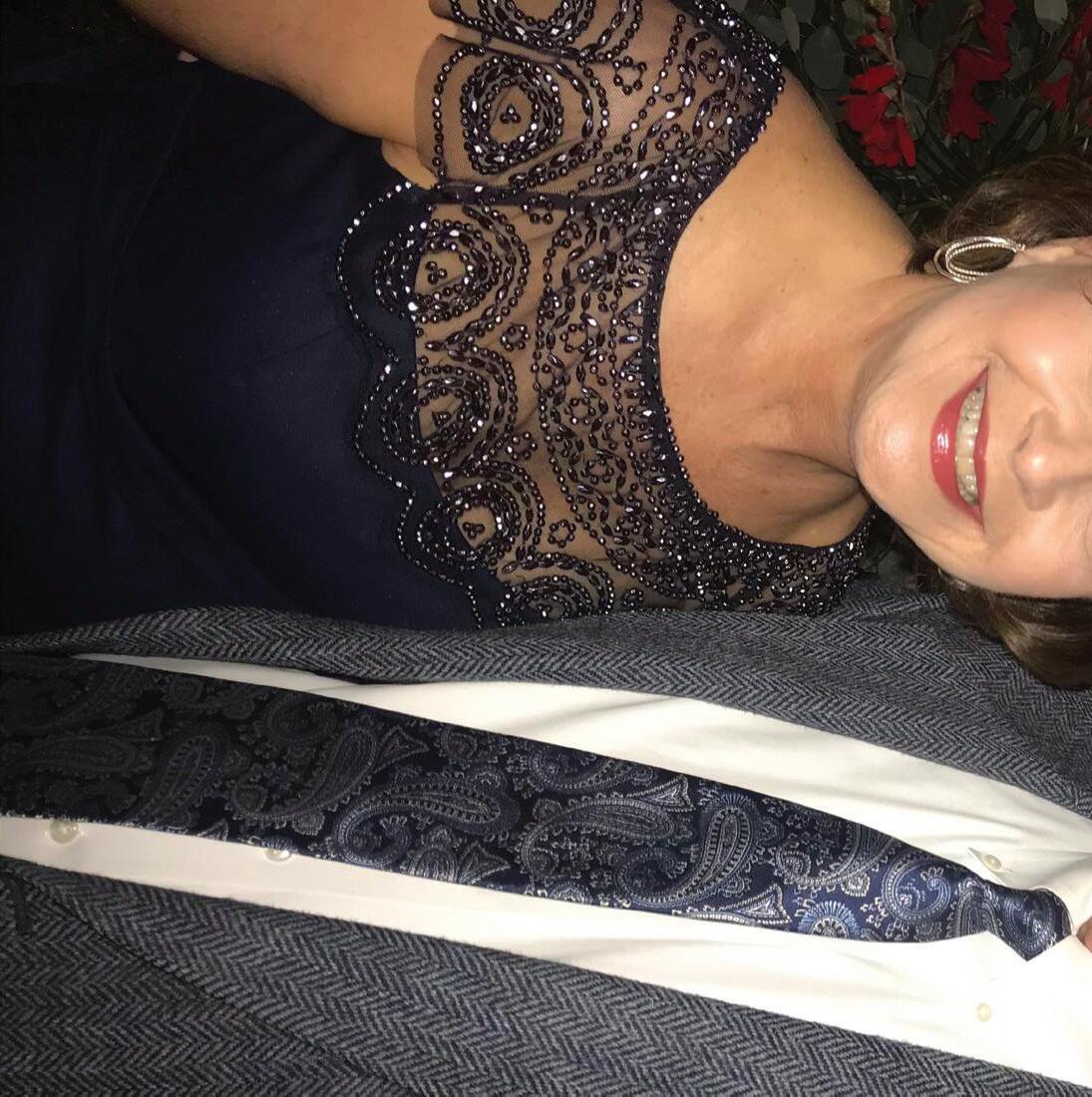
“We are lucky to have this resource here,” he said. Jeff has visited the center, played often in its golf tournament and attended many Lifeline annual banquets. “If you want a ‘feel good’ moment, go listen to those testimonials from the Lifeline clients. Many of them have lost everything, and they are people right here in western Kentucky that you see every day – at work, in the store, at church. To hear their success is so encouraging. To see what this community accomplishes never ceases to amaze me.”
Successful treatment mends families and strengthens our community, he said. In particular, he remembers the story of a supervisor at an auto dealership who lost his good job because of addiction. “He turned his life around here, and that dealer hired him back. That story might not have ended that way without this center.”
Jeff has been familiar with the center for years, starting with Terrye Peeler’s leadership several years ago. “What a soldier she is!” he said. He is equally impressed with new leadership and community involvement on the board. “I am more than encouraged with the new direction – the new facilities, the staff training. It is great to have this ministry here. I wish we didn’t need it, but I am so glad we have it.”
Peeler’s mother willed money to keep her daughter’s good work going A LIVING LEGACY
Anyone who knows anything about Lifeline knows the devotion and caring heart of Terrye Peeler, one of the women’s campus founders and retired executive director. She comes by it honestly.
Terrye’s mother, Jean D’Ambro, was a long-time Lifeline force behind the scenes, donating $800 a month, and then some, when needed, just to keep the electricity on.
“Mom loved me telling her stories about the clients and how Lifeline was making a difference for so many men and women,” Terrye said. “She always cried, and she told me often how proud she was of me because I took my 28-year alcohol addiction and used my story of God’s deliverance to help open the women’s center.”
When Terrye joined the board in 2005, Lifeline’s finances were in trouble. “I would share my fear of the utilities being disconnected, and she would always say, ‘How much do you need?’ “
About 10 years ago, Jean decided she wanted to leave a lasting legacy at Lifeline by including it in her will. When she died in August 2017, she left $100,000 to Lifeline, allowing it to pay off all debt for the women’s campus and contributing to a new men’s dormitory.
Jean had been a regular contributor to her church, and she willed money to her family; but she did not want to forget Lifeline, which had had such a profound impact on her only child, Terrye.

“She was my therapist,” Terrye said. “I could share all the ups and downs of what I wanted to accomplish, and how God was so instrumental in making a way over and over, where there didn’t seem to be a way.”
Now, Terrye sees her mother’s heart every time she visits both campuses.
“It is such a blessing to be reminded every day through the transformed lives at Lifeline that my mother’s legacy lives on,” Terrye said.
Interested in leaving a legacy gift?
You can create a lasting legacy through a bequest by naming Lifeline as a beneficiary in your will or living trust, life insurance or retirement accounts. It’s a simple process, outlined on our website. We would love to acknowledge your generous legacy intent during your lifetime, so please let us know by completing the Estate Intention Form from LifelineRecoveryCenter.org/ways-to-give.






